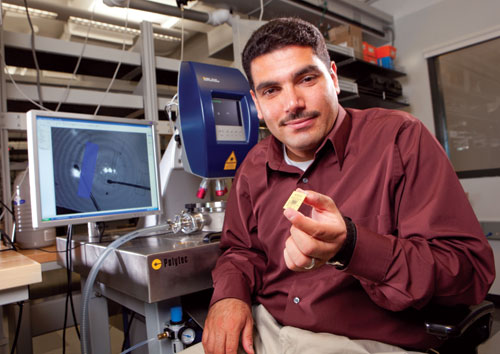Binghamton University's New York State Center of Excellence in Small Scale Systems Integration & Packaging (S3IP) works on a wide variety of R&D projects with industry, and makes its state-of-the-art facilities and tools available to partners and members. R&D collaboration with universities is becoming an appealing option for many companies looking to share costs, center officials said.
Sally Cole Johnson, Contributing Editor -- Semiconductor International, 12/28/2009
Most companies in the semiconductor industry are struggling to fund in-house R&D, which makes collaborating with universities an increasingly attractive option.
Binghamton University's Small Scale Systems Integration & Packaging (S3IP) Center is seeing increased interest in its electronics R&D projects. The center evolved from the Integrated Electronics Engineering Center (IEEC) and is funded by the New York State Center for Advanced Technology. The analytical and diagnostics facilities support materials diagnostics, analysis and characterization studies in systems integration, packaging and flexible electronics.
 |
|
Binghamton University's New York State Center of Excellence in Small Scale Systems Integration & Packaging (S3IP) offers industry opportunities to collaborate on a wide range of R&D projects. (Source: S3IP) |
The center's analysis and diagnostics facility is an 8000 ft2 lab with ~$21M worth of equipment, funded by the State of New York. "Now that companies no longer have the research budgets they once had, centers housed at universities with industrial partnerships are becoming an interesting business model," said Mary Beth Curtin, associate director.
The S3IP organization is also home to the IEEC, where the electronics packaging projects are housed; as well as the Center for Advanced Microelectronics (CAMM), which focuses on next-gen roll-to-roll electronics manufacturing. The Center for Autonomous Solar Power (CASP) develops energy storage and harvesting technologies.
The IEEC covers all the research topics typical to packaging, including electrical and mechanical analysis and testing, solder research, thermal, underfill, micromechanics, photomechanics, failure mechanisms and acceleration factor determinations. They also offer students a certificate in electronics packaging.
The center offers access to test equipment like temperature and humidity chambers, thermal cycling chambers, a HAST chamber, a real-time X-ray machine, and an acoustic microscope, as well as SEM and X-ray imaging systems.
"Most of our staff have more than 20 years of industrial experience, so we understand working with companies and their schedule needs," said Bill Infantolino, associate director of the IEEC.
Project topics the past few years have centered on lead-free solders, MEMS packaging and thermal interfaces. The energy business has emerged as a key area of interest at Binghamton University. CASP includes R&D on solar cells, flexible solar collectors and energy storage devices. Another center is being organized to address data center cooling.











